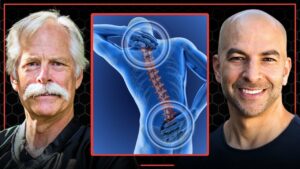In this video, two experts discuss the importance of addressing back pain early on, especially for young individuals. They emphasize the need for a personalized assessment to understand the specific cause of pain, rather than relying on generic online resources. The experts suggest exercises and self-tests to help individuals recognize patterns in their pain and develop a tailored strategy for relief. They also highlight the importance of behavior change, such as avoiding prolonged sitting and staying active. The discussion highlights the challenges in motivating individuals to take proactive steps to prevent back pain, but emphasizes the long-term benefits of early intervention.

Our Summaries are written by our own AI Infrastructure, to save you time on your Health Journey!
Key Insights:
- Back pain is a common issue that affects many people, especially those who have experienced it multiple times or for a prolonged period.
- Changing behavior and taking preventive measures can help maximize the longevity of the spine, even for young individuals.
- It can be challenging to motivate someone to make lifestyle changes unless they have experienced the negative consequences firsthand.
- Recognizing and understanding the specific patterns and triggers of back pain is crucial in developing an effective strategy for pain management.
- Assessments and self-tests can help identify the causes and subcategories of back pain.
- Seeking guidance from knowledgeable professionals is crucial in formulating a personalized exercise and mobility routine.
- Finding reliable online resources that provide accurate information and exercises for back pain can be challenging due to the abundance of misleading or ineffective advice.
- The importance of strategic exercise sessions, avoiding prolonged sitting, and seeking expert guidance to maintain spinal health.
- The speaker retired early due to the negative impact of a sitting job on their health, but now, they are healthier than they were during the later years of their career.
Transcript
What would you say to the person who’s watching or listening to us right now? I realize that there’s a pretty good chance that by now, because we’re a couple of hours into this podcast, if you have never experienced back pain, you might not be listening anymore. The truth of it is, there’s going to be a lot of people listening because if you’ve experienced back pain, especially if it’s happened more than once or if it lasted for more than a week or so, you know this is a riveting discussion.
But if you were talking to a person of any age who had yet to experience it, but in particular, maybe a young person, someone in their 20s or 30s, what would you say to them and how would you counsel them with respect to what they could do to maximize the longevity of their spine?
What a fabulous question! If I was to say to you, a young fella comes into your office with a cigarette hanging out of his mouth, what would you say to him that he hasn’t already heard? And, you know, I would love to take you over to the Cancer Ward at the hospital and I want to show you how your last days are going to look. That might convince a few of them on the lunacy of what they’re doing to themselves. But, you know, it won’t be 100% effective, and I would have to guess it wouldn’t be close to 100%. Their friends and peer pressure are far more important for them now. And that’s how I’m going to answer the question you just asked of me.
I don’t have very good luck when I see someone who’s all balled up. A 30-year-old called me last week, and this guy was all balled up like this, and he said, „Whenever I do exercise, I’m just exhausted.“ I said, „Okay, would you move away from your desk a little bit and would you ask someone to come in and hold your cell phone up so I can see all of you?“ And there he was. I said, „Alright, would you now sit at your stool, sit upright for me. Do you have pain?“ He goes, „No.“ I said, „Good, drop your chest down and lower your head. Do you have pain?“ He says, „Yeah, I do.“ I just proved to him what caused his pain.
So, to your point, I don’t think I changed his behavior one little bit. And he’s going to have to suffer a little bit more before he comes to a realization that he does have the power to do something. It’s so hard to motivate someone. Maybe you have a hint for me now?
I share your sentiment exactly. That’s why I’ve often referred to that third bout of back pain that I had, the one that lasted for a year, as the best worst experience of my life. It was the worst experience in that I wouldn’t wish that duration or depth of pain on anyone. But what was so good about it is that it lasted for so long that it created a lifelong change in behavior and an appreciation for something. Which is, without that experience, this idea of a centenary decathlon wouldn’t exist because you have to sort of see what a life looks like with immobility and pain. Because even though I was only 27, I lived that year as though I was 87. And a year is long enough that it imprints. If it was only a week, no matter how bad it is, I don’t think it would have imprinted. But a year of that really imprinted on me.
Now, let’s turn our attention to the people who have experienced back pain, personally or through watching someone they care about. Let’s start with this: What are the best online resources we can point people to that can help with the types of exercises, maybe some dos and don’ts around lower back pain? I love that you even clarified around the Big Three, which is great if you need stability, but if you need mobility, we might need some different exercises. So, how can people navigate their way through that?
I challenged myself with exactly the same issue 15 years ago, just as the internet was getting going. But here’s the thing: There is no such thing as non-specific back pain. And if that’s what the person operates on in their strategy, this non-specific thing, it will only be dumb luck if they’re able to come up with a strategy to mitigate it. They have to have an assessment. They can go and see someone who is very knowledgeable and converge on an understanding of their pain.
Most of the time, well short of that, I wrote „Back Mechanic.“ Now it’s not on the internet, and the reason is they have to have some background understanding of how their back works and then go through a series of self-tests. That’s what the book does. The first thing it does is tell you to draw a table: what are activities that cause you pain, what are activities that either take your pain away or are neutral. Write them all out. Now, let’s start pattern recognizing those. All of those activities involve you bending backwards. We’re starting to learn a little bit about what could be the candidates. Then we take them through some physical tests, such as sit on a chair, slouch, extend, drop one shoulder back, hold five pounds out in front with arm straight (a compression test), then we do a few self-shear tests, and then we do some nerve tensioning postures to start converging on subcategories of their pain.
If you have this subcategory, if you have pain when you sit in front of your computer, going for a walk is relieving. The next person sitting at the computer is their relief, and they go for a walk and that causes their pain, probably more in the stenosis older person kind of category. The other one is a younger dynamic disc bulge. Okay, sit with a lumbar support. Number one. Number two: we are now going to have a strategic exercise session. You’re going to do the Big Three. We’ll mobilize the hips. You’re not going to sit longer than an hour at your computer, you just cannot reach a stage of sufficient health if you continue with that behavior. That’s my answer to your question.
And just going back to listening to you, just as you started to answer that question, I’ve got a little bit of good news for you in terms of your own back. And by the way, I know who I’m talking to, so I know you get this. But this is for the readership or the listenership. I retired early, I retired when I was 60. I reached a stage where I realized what my job was. My job got turned into a sitting job, and it was killing me. I realized that my health was declining, my fitness was declining. I still walked to the university. I strategically bought a home right on the edge of campus so I would have a 20-minute walk to and from my office and laboratory. Still, I was declining. So, I walked away. I shut the door in my office and said to the graduate students, „Take all my books to the other professors. Take my lab.“ I just walked away, never thinking that anyone would ever ask me again because I’m not producing new data anymore.
But my point is, Peter, I’m healthier now than I ever was in the latter 15 years of my computerized work life.





